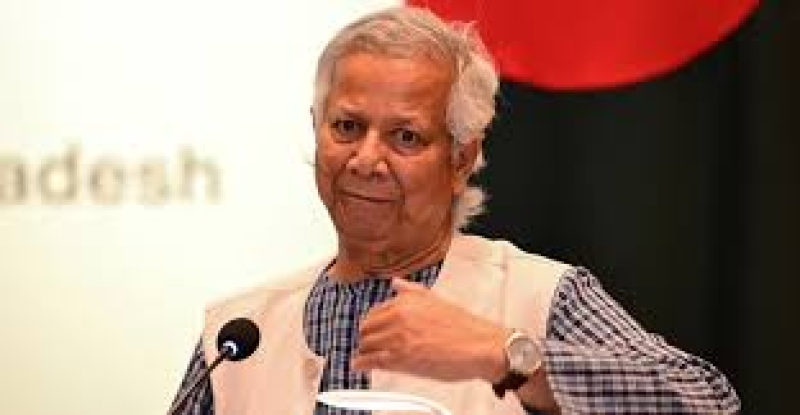- Tarique Rahman returns home amid rapturous reception |
- Home After 17 Years: Tarique Returns to Gulshan Residence |
- Tarique Calls for United Effort to Build a Safe Bangladesh |
- Tarique leaves for 300 feet area from airport |
- BNP top leaders welcome Tarique Rahman on homecoming |
Yunus Criticizes Hasina's Regime, Pledges Reforms Before Polls

In an exclusive interview with Nikkei Asia, Bangladesh’s Chief Adviser Professor Dr. Muhammad Yunus strongly criticized the ousted government of Prime Minister Sheikh Hasina, claiming it “destroyed everything.” Yunus emphasized the need for significant constitutional, judicial, and electoral reforms before holding the next general elections, reaffirming the interim government's commitment to rebuilding the country.
“We need extensive reforms in key areas such as the economy, governance, bureaucracy, and the judiciary before we can hold elections,” Yunus told the Japanese publication on Saturday. The interview was published on Monday, shedding light on the interim government's agenda.
According to Yunus, the interim administration has already established several commissions tasked with recommending reforms in the electoral system, the constitution, and the judiciary. These recommendations are expected by January, after which full-scale reforms will begin. "Implementing these reforms will take time, as we are essentially building a ‘new Bangladesh’ from the ground up," he explained.
When asked about his potential candidacy in the upcoming election, Yunus firmly rejected the idea. "No, I’m not a politician. I’ve always stayed away from politics," he stated. He added that only individuals who are committed to principles, adhere to rules, and are free from corruption should run for office.
Yunus also reflected on the lasting damage he believes Hasina’s 15-year rule inflicted on Bangladesh. "The country’s governance structure was completely dismantled under Hasina’s regime. Our priority now is to restore democracy, rebuild economic stability, and regain public trust," he said. He accused Hasina of undermining democratic values, holding fraudulent elections, and ruling with authoritarian tendencies. “She manipulated elections for three consecutive terms, claiming victory without opposition, and governed with a fascist approach,” Yunus remarked.
The violence that erupted during student-led protests in August, which initially targeted public-sector job quotas and later called for Hasina's resignation, intensified following the deaths of numerous demonstrators. Amidst the unrest, Hasina was reportedly forced to flee by helicopter to neighboring India.
Yunus also discussed the legal repercussions facing Hasina, revealing that in October, Bangladesh's International Crimes Tribunal issued an arrest warrant against her. “Once the trial concludes and a verdict is reached, we will formally request India to extradite her,” Yunus said, highlighting an international agreement that obligates India to comply.
On the diplomatic front, Yunus emphasized the importance of fostering a strong, cooperative relationship with India, while also proposing the revival of the South Asian Association for Regional Cooperation (SAARC), which has been largely dormant due to tensions between India and Pakistan.
Regarding concerns raised by the Indian government over the safety of minority Hindus in Bangladesh, Yunus dismissed these claims as “propaganda” and invited Indian journalists to investigate the matter firsthand. "We are working to explain this to the Indian government and correct the misinformation,” he added.
Turning to other regional issues, Yunus hailed China as “a true friend” of Bangladesh, citing its assistance in infrastructure projects like roads, power plants, and seaports. Bangladesh is also exploring the opportunity of joining the Association of Southeast Asian Nations (ASEAN) as it prepares to graduate from the UN's Least Developed Countries list in 2026. Yunus revealed that he had discussed Bangladesh's ASEAN membership with Malaysian Prime Minister Anwar Ibrahim, who expressed support. “He is willing to welcome Bangladesh into ASEAN, though several steps are required, including a resolution to amend ASEAN's membership criteria," Yunus explained. He also expressed hope that Bangladesh could gain recognition as a Sectoral Dialogue Partner within ASEAN.
On the ongoing Rohingya crisis, Yunus reiterated Bangladesh's stance that the displaced Rohingya Muslims should return to Myanmar. "How long can Bangladesh bear this responsibility? We need a clear destination and a shared objective to resolve this crisis," he said. Yunus suggested the establishment of an UN-administered safe zone in Myanmar, where the Rohingya could stay in camps until it is safe for them to return home. "If the situation in Myanmar stabilizes, they can return without needing to be relocated to another country," he concluded.

